The Ultimate Guide to Spread Betting on Sport

Spread betting sounds complicated when you first look into it, but to understand the basics, all it takes is a small amount of research.
In this guide, we are going to explain all the jargon simply and condense all the information you need to start spread betting sports.
Spread betting is a term often used in investment circles but applies to specific types of sports betting as well.
A spread bet is not the same as a traditional ‘win-lose’ bet. This will all be explained in this spread betting sports guide.
The Basics of Spread Betting
A spread bet is a wager in which the payoff changes based on the accuracy of the wager. The more accurate the bet, the greater the payoff. Likewise, the less accurate the bet, the greater the loss.
A ‘normal’ win-lose type of wager can be described as having ‘fixed odds’. If you place a £10 bet on Man United to win at odds of 2.0, you will either lose your £10 or win £10. Nothing more, nothing less.
For a spread bet, a bookmaker will offer a ‘spread’ of outcomes. The punter bets how much above or below that spread the final outcome will be.
Spreads offered by bookmakers can be anything from the number of goals scored in a football match to the number of lengths a horse wins by in a horse race.
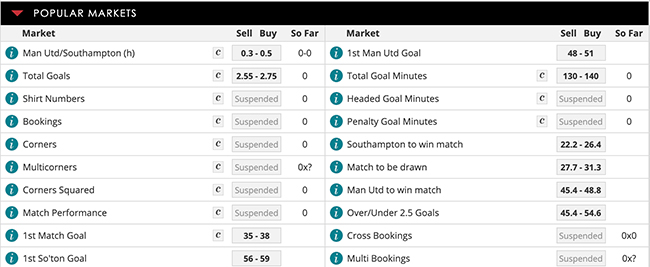
The above image shows some of the popular spread betting markets available on a football match between Man United and Southampton.
You can see that there is a spread available for the first Man United goal. The spread is 48-51, as in the goal will be scored before the 48th or after the 51st minute of the match. We will explain further in the following example.
Spread Betting Example
We will use the 2019 Ashes Series between England and Australia as our example.

Above you can see all of the markets available for Series Totals and Specials. We want to bet on the total number of wide balls bowled throughout the series.
The bookmaker has set the spread at 49.5-51.5, and so far in the series, there have been 33 wide balls in the 3 matches played.
As a punter, we can elect to ‘buy’ a spread or ‘sell’ a spread. If we think there will be 52 or more wide balls, then we will be buying the spread. If we think there will be 49 or less wide balls, then we will be selling the spread.
We will buy the spread and our stake is £5. If there are 60 wide balls total, we will win our bet. The amount we win is our stake (£5) multiplied by how many ‘points’ – in this case wide balls – over our buy price the outcome was.
In this example, we will win £5 x 8 = £40.
However, if the total number of wide balls is 51 or less, we will lose our bet. The amount we lose is calculated the same way. If only 40 wide balls are bowled, we will lose £5 x 11 = £55.
If the total number of wide balls bowled in the series is between 49.5 and 51.5, everyone loses (apart from the bookmaker!).
As you can see, there is the potential for losses much larger than our initial stake. This puts many people off using spread betting. As long as we manage our risk appropriately, this should not be too much of a problem.
Spread Betting Glossary – The Jargon Explained
There is a lot of jargon to get to grips with when learning about spread betting. Here we will explain most of the common terms in ways that are easy to understand.
Stake – This is the amount which controls how much you will win or lose. Unlike in fixed-odds betting, you can lose much more than your stake. The amount of you win or lose is the point value multiplied by the stake.
Make-up – This is the final result or outcome of the event being wagered on. For our example, if there were 58 wide balls bowled in a match, the make-up is 58. If we were betting on total goals in a football match and the score ended as 3-2, the make-up would be 5.
Points – When making a spread bet, you bet on how many ‘units’ or ‘points’ above or below a certain threshold an outcome will be. For a bet on the total number of runs scored by a batsman with the spread at 76-80, you might buy at 80. In this case, points are the same as runs. If the batsman scores 90 runs, you will win your stake multiplied by the total points over the buy price. In this case 10 times your stake.
Buy – Buying a spread bet means you think the outcome will be higher than the spread. You will win your bet if the outcome is greater than the highest point in the given spread.
Sell – Selling a spread means you think the outcome will be lower than the spread. You will win your bet if the outcome is less than the lowest point in the given spread.
Spread – This is the difference between the buying and selling price for a given market. The spread is determined by the bookmaker and the live market. If the outcome is between the buy and sell price, the bookmaker wins all bets.
Volatile – The volatility of a market is the potential for profit or loss. The market for total goals in a football match is much less volatile than the market for total runs in a cricket match.
Credit Limit – It is possible to place bets on spread betting websites with credit as a security. In the event of a loss, the amount will be settled through the credit firm. A deposit may still be required when placing the bet as extra security for the bookmaker.
Push – This occurs when the result is tied with either the buy or sell price in the spread. To prevent this from happening, most spreads are given as fractional half-points. The bookmaker may also declare ‘ties win’ or ‘ties lose’ if the spread is not given as fractional half-points.
Collateral – This is either an amount of money or capital such as a deposit that serves as a lender’s financial protection. For sports spread betting, this can either be a cash amount in the punter’s account or can be secured through a credit agency.
How to Start Spread Betting
Have you decided if spread betting is for you? If you are confident in your ability to predict a winner, you can be rewarded much more than with traditional fixed-terms betting. However, it is important to remember that losses can be equally large.
There are several different spread betting platforms available in the UK for spread betting. Two sites are by far the most popular; SpreadEx (up to £300 cashback by signing up here), and Sporting Index. There are also several tipster services available for a monthly fee.
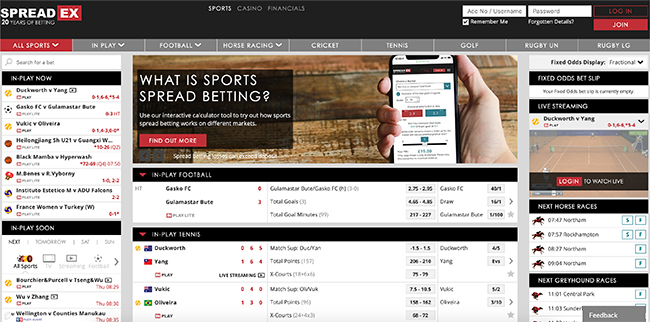
SpreadEx offers financial and sports spread betting, as well as traditional fixed-odds betting.
They also offer casino-style betting.
In sports spread betting, SpreadEx offer markets for football, cricket, rugby, horse racing, tennis, and golf.
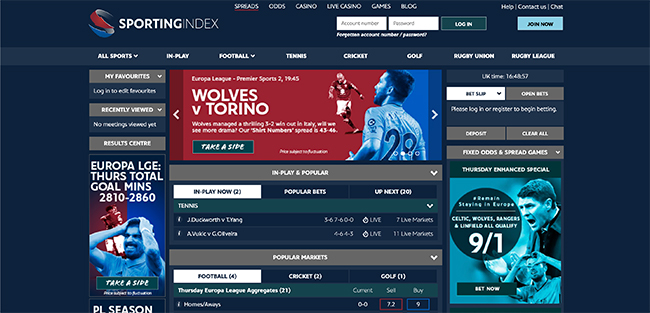
Sporting Index is another large spread betting-focussed company and claims to have a UK market share of over 70%. You can use their site to spread bet on football, golf, tennis, cricket and rugby.
Sporting Index also offer fixed-terms betting and casino games. They have a sign-up bonus of £100 to bet with at the time of writing.
It is important to have the right mindset before getting into the world of spread betting. Although the potential for profit is greater than with fixed-terms betting, the potential for loss is equally as great.
The key thing to remember is that unlike with fixed-terms betting, you stand to lose more than your stake. This is taken into account by the bookmaker, and they may ask for a deposit in order to place your bet. This security can also be taken on using credit, however, this is, of course, more dangerous for the punter.
It is important to set aside money for gambling and keep your personal finances separate. Many unfortunate people have fallen into a gambling spiral through spread betting and lost their personal assets, including housing.
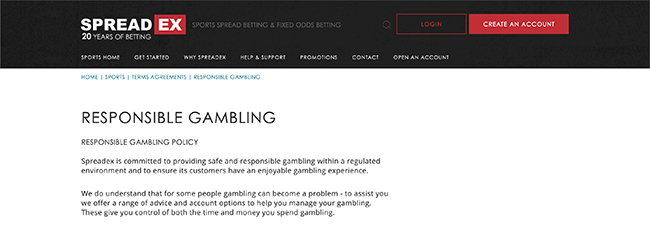
It would be pertinent to have a spreadsheet system set up at home so you can keep track of your bets. This also provides you with a record of successes and failures you can learn from moving forward. We will discuss this later on in this spread betting guide.
Spread Betting Strategies
Before you start spread betting, it is important to decide your intentions. Are you gambling for fun or are your gambling with the sole purpose of making profits? A professional will always do as much research as possible before taking any action.
With spread betting, the potential for profit and loss is large.
Remember you are betting against the house, and of course, the house always wins. Spread betting firms have huge amounts of statistical data at their disposal when they come up with their odds.
One tactic is to wait until the last minute to place your bets.
If your basis for backing a certain football team is their one-star player. The team news comes out and he isn’t starting. You may have made a mistake in having already placed your bet.
However, betting early means you can take advantage of odds that have not been adjusted to the market yet.
Price-following companies will wait to see which way the market is moving before releasing their odds, but price-setting companies can be taken advantage of if you believe your research to be better than theirs.
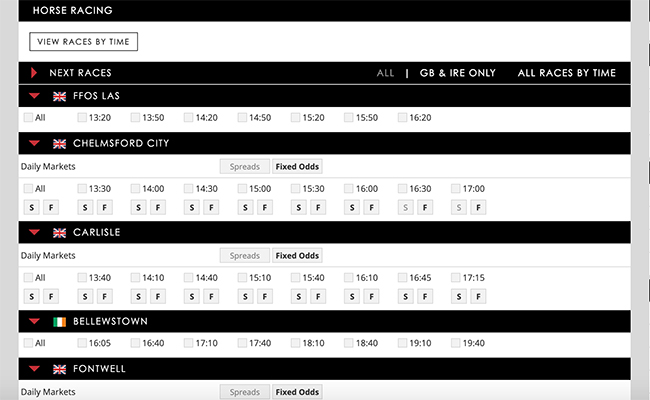
Another tactic is to stick to one market. Over time, you can become more knowledgeable and therefore make more informed decisions.
Rather than betting on horse-racing in general, consider sticking just to the GB and IRE market. Or for football, perhaps just stick to a single division.
Try not to be distracted by hype. It is important to focus on the statistics and make sensible, informed decisions. Avoid betting on matches involving your home team in football, for example.
Even though you may have good knowledge of the team’s capabilities, it is easy to become biased towards them if you actively want them to succeed.
There are markets available through spread betting that are not available with traditional fixed-terms betting.
One of the most popular spread betting markets is known as ‘supremacy’. This involves predicting how dominant the winner will be in an event.
In football, if you think one team will score a lot more goals than their opposition, you would ‘buy’ them in a supremacy bet.
If they score more goals than the price point you bought them for, you will win your stake multiplied by how many goals over that price point they win by.
Spread Betting Offers
We can take advantage of the offers provided by spread betting companies using our matched betting method. This includes sign-up offers and free bets.
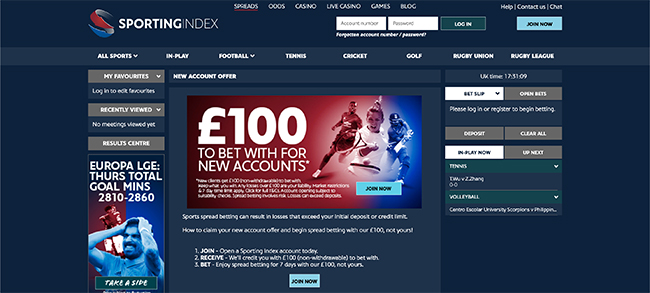
Sporting Index have a sign-up offer of £100 for new accounts. This means you can sign up, place a bet, and keep whatever winnings you make. You are also covered for losses here by the £100. Remember, if you lose more than this amount you will be liable for it out of your own pocket.
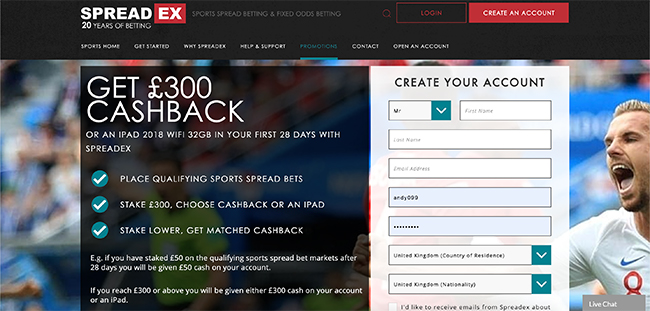
SpreadEx also have a sign-up bonus. You can get either an iPad or £300 cashback if you stake a total of £300 in your first 28 days from signing up.
SpreadEx also offer occasional ‘spread-free’ bets which are worth taking advantage of. This means that instead of having to buy or sell above or below the spread, you can bet at the midpoint of the spread.
Using our matched betting method, we can make free profits using these and other sign-up offers. All we have to do is take care when making all of our bets and it’s money in the bank.
How to Control your Risk
It is important to keep your total risk as low as possible when spread betting. An easy way to do this is to set up a stop-loss, or a credit limit that means you will automatically be traded out of a bet in the case of a heavy loss.
Many traders simply pick an amount to stake out of thin air, or just always stake the same amount. This is a mistake.
To be successful, you must take into account the size of your bank, the perceived risk, and how much of your bank you are prepared to risk.
A sensible amount that many traders agree on is 2% of your capital as your stake. This is why it is key that you have a large bank, to begin with when getting into spread betting.
Even if you are making a long-term profit, there will always be a few days in a row where you make losses.

If your stake is too large when you make your losses, the overall decrease in your bank size could take a long time to recover from.
The world of sports betting is an inherently volatile one. Huge comebacks and capitulations are commonplace in the world of sports.
Part of controlling your risk is having the ability to cash out in to lock-in a profit or prevent a catastrophic loss.
You must always bear this in mind when spread betting…
As well as doing your research before the event, you must constantly analyse the event during play if you have the option of cashing out.
If you can sense that the tide is turning against you, it is often better to cut your losses and try again another day.
Keeping Track of Your Results
There are many reasons for keeping track of your spread betting. You need to be sure which bets you have made in order to keep track of your risk.
A spreadsheet can calculate this automatically and make sure you don’t exceed your maximum ratio of risk: capital.
A lot of lessons here can be learned from financial spread betting traders.
Although sports spread betting is somewhat different, they share many of the same concepts when it comes to managing risk and especially when keeping track of your results.

There are many spreadsheet templates available for free, like this example. As well as keeping track of your bets, you can also track your total risk at any given time.
Whilst it is less time-consuming to use a spreadsheet created by someone else, a lot can be said for creating your own. You can select your favourite metrics from the free options out there, and combine them into your custom spreadsheet.
Not only do you have the information that you want at your fingertips, you will most likely learn something along the way.
If you want to get into spread betting for profit-making, having your own way of record-keeping is essential.
About the Author
This post was written by Andy Beggs. Andy is a keen sports fan and has been writing for Beating Betting from his home in Australia since August 2019.
